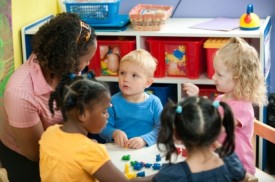
In today's fast-moving, highly competitive global economy, our students need every advantage we can afford them to ensure that they develop into the well-prepared leaders and thinkers of tomorrow. This past August, an article in Science Daily offered a helpful summation of the research, Learn more in kindergarten, earn more as an adult. According to the article, John Friedman and his research team at Harvard have found that—quite literally—higher test scores in early learners lead to higher incomes later in life.
Their studies indicate that:
- Kindergarten students who raise their Stanford Achievement Test scores from average to the 60th percentile can expect to make about $1,000 more a year at age 27 than students whose scores remain average.
- Those same youngsters who learn more—as measured by an above-average score on the Stanford Achievement Test—and are in smaller classes earn about $2,000 more a year at age 27.
- Those who learn more in kindergarten are 1) less likely to become single parents, 2) more likely to own a home by age 28, and 3) more likely to save for retirement earlier in life.
Other key factors for long-term success include smaller class sizes and teacher experience. Overall, early learningexperiences such as those in preschool and kindergarten had a marked impact on overall life success.
Additional results from several model programs have shown the positive effects of preschool participation on school completion and years of education. Long-term studies of participants in three different preschool programs found that:
- Program participants were found to have higher rates of high-school graduation (67% vs. 49% at age 19; 71% vs. 54% at age 27).
- Participation was associated with a higher rate of attending four-year college (36% vs. 14%).
- Study participants had higher rates of school completion (49.7% vs. 38.5% at age 20; 65.8% vs. 54.2% at age 22). (Reynolds, Suh-Ruu. pp.2)
Why might these early learning experiences have such far-reaching affects? Researchers have developed a number of interesting hypotheses. According to the cognitive advantage hypothesis, preschool experiences lay a cognitive and developmental foundation that result in improved developmental and academic outcomes later on. Another hypothesis, the family support hypothesis, essentially says that participation in preschool programs promotes parental involvement and greater contact between parents and teachers, increasing the effectiveness of a child's earliest learning experiences at home as well as at preschool. (Reynolds, Suh-Ruu. pp.3)
Whatever mechanisms are at work, the data clearly tells a story that every educator and parent should understand; we cannot underestimate the importance of positive, effective school experiences for our youngest learners. Whether we consider this data from a parental or societal perspective, the conclusion is clearly the same: we must clearly prioritize delivering productive, quality learning experiences to our young learners as early as possible to ensure that they develop the solid foundations on which they can build successful futures.
For more details and a deeper perspective on the implications of this research on public policy, see these studies:
- Preschool Education and School Completion. Suh-Ruu Ou, PhD. Arthur J. Reynolds, PhD. Waisman Center, University of Wisconsin-Madison, USA. February 25, 2004.
- Preschool Education and Its Lasting Effects: Research and Policy Implications . W. Steven Barnett, Ph.D. National Institute for Early Education Research. Rutgers University. September 2008.
- The High/Scope Perry Preschool Project . John J. Wilson. OJJDP Juvenile Justice Bulletin. October 2000.

